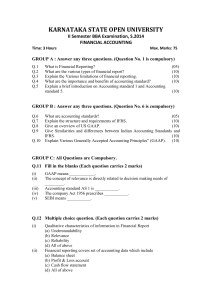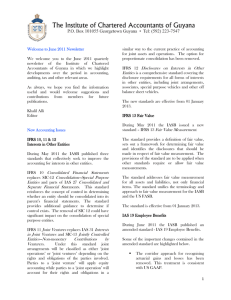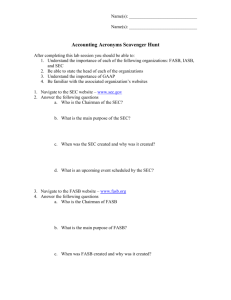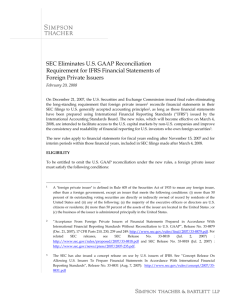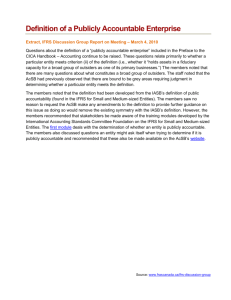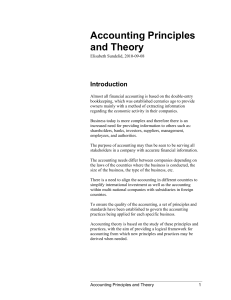ISDA supports SEC's proposal for foreign private issuers
advertisement
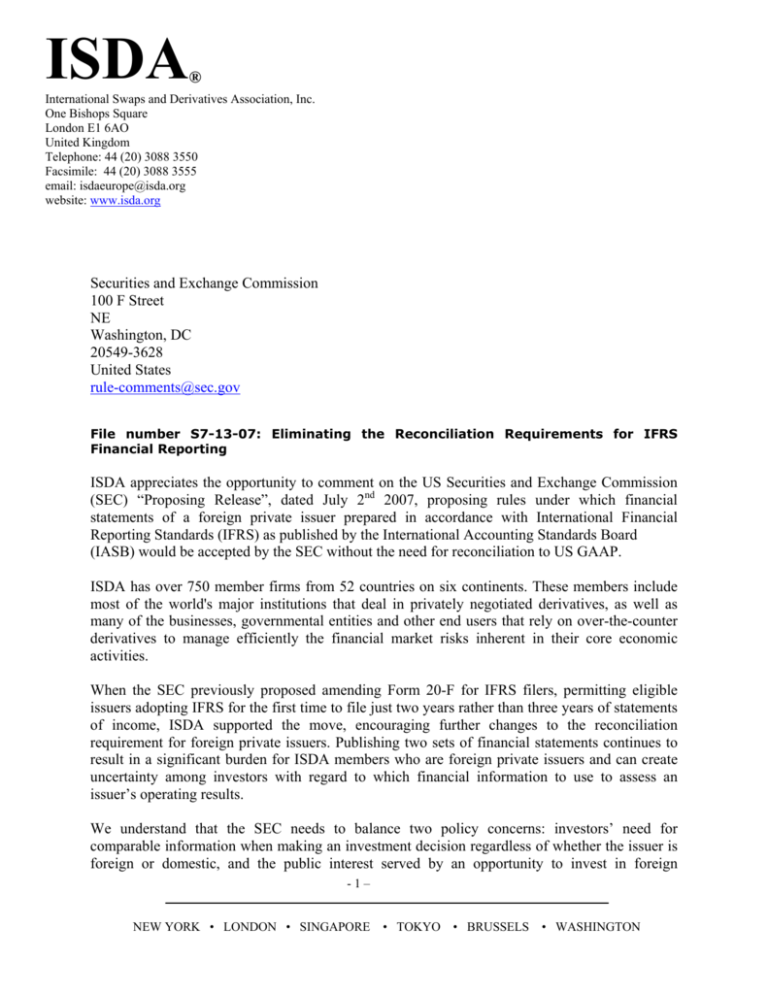
ISDA ® International Swaps and Derivatives Association, Inc. One Bishops Square London E1 6AO United Kingdom Telephone: 44 (20) 3088 3550 Facsimile: 44 (20) 3088 3555 email: isdaeurope@isda.org website: www.isda.org Securities and Exchange Commission 100 F Street NE Washington, DC 20549-3628 United States rule-comments@sec.gov File number S7-13-07: Eliminating the Reconciliation Requirements for IFRS Financial Reporting ISDA appreciates the opportunity to comment on the US Securities and Exchange Commission (SEC) “Proposing Release”, dated July 2nd 2007, proposing rules under which financial statements of a foreign private issuer prepared in accordance with International Financial Reporting Standards (IFRS) as published by the International Accounting Standards Board (IASB) would be accepted by the SEC without the need for reconciliation to US GAAP. ISDA has over 750 member firms from 52 countries on six continents. These members include most of the world's major institutions that deal in privately negotiated derivatives, as well as many of the businesses, governmental entities and other end users that rely on over-the-counter derivatives to manage efficiently the financial market risks inherent in their core economic activities. When the SEC previously proposed amending Form 20-F for IFRS filers, permitting eligible issuers adopting IFRS for the first time to file just two years rather than three years of statements of income, ISDA supported the move, encouraging further changes to the reconciliation requirement for foreign private issuers. Publishing two sets of financial statements continues to result in a significant burden for ISDA members who are foreign private issuers and can create uncertainty among investors with regard to which financial information to use to assess an issuer’s operating results. We understand that the SEC needs to balance two policy concerns: investors’ need for comparable information when making an investment decision regardless of whether the issuer is foreign or domestic, and the public interest served by an opportunity to invest in foreign -1– NEW YORK • LONDON • SINGAPORE • TOKYO • BRUSSELS • WASHINGTON ISDA® International Swaps and Derivatives Association, Inc. securities. However, we agree that the burden placed on foreign private issuers of meeting the additional disclosure requirements could act as a deterrent to them listing in the US and may ultimately deprive US investors of investment opportunities. Therefore ISDA is delighted to support the SEC’s proposal to allow a foreign private issuer to file financial statements prepared in accordance with IFRS as published by the IASB without reconciliation to US GAAP. Key messages: • ISDA supports the SEC’s proposal to allow a foreign private issuer to file financial statements prepared in accordance with IFRS as published by the IASB without reconciliation to US GAAP. The streamlining of reconciliation requirements will ease the entry of foreign companies into the US public securities markets in a manner consistent with investor protection. • We agree with the SEC that a particular degree of convergence between US GAAP and IFRS should not be a prerequisite for the acceptance of financial statements prepared under IFRS as published by the IASB without reconciliation to US GAAP. Rather the decision to remove the reconciliation requirement should be based on the appreciation of a robust process that ensures high quality accounting standards, whilst supporting continued progress towards convergence and the joint development of standards over a realistic timetable in the future. • We support the SEC in recognising that the financial information provided by international accounting standards will be adequate for investors even if it is not always the same as the information provided under U.S. GAAP. We believe convergence to be a good thing, but more importantly we believe it is possible to accept two robust frameworks from which investors can make the same decisions. • The consequences of a “principles based” accounting framework should be fewer rules based standards. The SEC should not be tempted to address areas not covered by IFRS and in particular should not seek to provide its own guidance on the appropriate interpretation and application of IFRS. The SEC should therefore recognise and respect the integrity and independence of the IASB’s due process and the IASB’s aim of developing “principles based” accounting standards. • In some jurisdictions there is the potential for companies to be prohibited from using IFRS as published by the IASB (e.g. in Europe if a particular standard or interpretation is not endorsed). Under such circumstances we think it might be appropriate for the SEC to consider accepting reconciliation to IFRS as published by the IASB rather than a full reconciliation to US GAAP. As different questions are aimed at different stakeholders it would be inappropriate for ISDA to offer a view on all forty nine questions included in the release. For example ISDA is not best -2– NEW YORK • LONDON • SINGAPORE • TOKYO • BRUSSELS • WASHINGTON ISDA® International Swaps and Derivatives Association, Inc. placed to opine on how useful the reconciliation to US GAAP from IFRS is as a basis for comparison between companies using the different accounting standards (questions 11 and 12). So what we have done instead is to pick the themes relevant to our industry and our members covered by the full list of questions, hopefully in the appropriate order, and presented more detailed comments on each of these themes in the appendix to this letter. The relevant SEC question numbers are included in brackets after the relevant thematic response. We would be pleased to discuss our comments further with the SEC or its staff and to arrange this contact either Melissa Allen at Credit Suisse or Ed Duncan at ISDA. Yours faithfully Melissa Allen Chair of ISDA’s European Accounting Committee Managing Director, Credit Suisse Ed Duncan Policy Director, ISDA -3– NEW YORK • LONDON • SINGAPORE • TOKYO • BRUSSELS • WASHINGTON ISDA® International Swaps and Derivatives Association, Inc. Appendix: Detailed ISDA comments IASB due process and quality of IFRS ISDA has been a keen observer of the IASB over many years now, and has worked closely with staff and Board members in particular in relation to the IAS 32 and IAS 39 improvements project and the development of IFRS 7 which collectively address the recognition, measurement and disclosure of financial instruments. We believe the IASB is committed to its goal of developing a single set of high quality, understandable and enforceable global accounting standards that require transparent and comparable information in general purpose financial statements. During this period we have also witnessed an increase in the IASB’s co-operation with national standard setters and an increased focus on achieving convergence in accounting standards around the world. The IASB’s consultation procedures have been clearly laid out in a Due Process Handbook which was the subject of a consultation in 2004 and 2005. Furthermore the Trustees have set up a special committee, the Trustees’ Procedures Committee, with the task of regularly reviewing and, if necessary, amending the procedures of due process in the light of experience and comments from the IASB and constituents. Many of the suggestions for improvements made by ISDA and other constituents were either adopted by the IASB as a result of its own internal review, or subsequently adopted following the broader consultation. In conclusion ISDA believes the IASB’s standard setting process is a well documented, clear, accessible and transparent process. [SEC Question 1] ISDA recognises the role the SEC has played in the international standard setting process as an “observer” on the Standards Advisory Council of the IASB (SAC). The primary objective of the SAC is to provide a forum where the IASB can consult individuals and representatives of organisations affected by its work. As part of that consultative process the SAC aims to provide the IASB with advice on its agenda, project timetable and priorities, along with advice on practical application and implementation issues. This includes the SAC discussing matters relating to IFRS standards that may warrant consideration by IFRIC. We also recognise the indirect role the SEC plays through its oversight of the FASB and their activities, particularly in relation to convergence of IFRS and US GAAP and the FASB’s cooperation with the IASB. The FASB has been meeting with and working closely with the IASB for some time now, and shares its objective of establishing a single set of high-quality accounting standards for both domestic and cross-border financial reporting. Clearly the SEC has built strong connections with the IASB and this will help the SEC in determining how best to engage with the IASB in relation to significant issues concerning any existing or future IFRS standards and their interpretations. [SEC Questions 8 and 9] Convergence ISDA believes that the recognition of IFRS by the SEC (or for that matter the EU Commission’s stamp of “equivalence”) does not achieve convergence and is not in itself the end game. We -4– NEW YORK • LONDON • SINGAPORE • TOKYO • BRUSSELS • WASHINGTON ISDA® International Swaps and Derivatives Association, Inc. firmly believe the convergence process should lead to better standards, and not simply similar ones. Therefore we think there will continue to be more than adequate incentives for standard setters, issuers, investors and other users of financial statements to work towards a common goal of high quality, understandable and enforceable global accounting standards. However we believe it is possible to accept two robust frameworks from which investors can make the same decisions. [SEC Questions 2 and 45] Experience with the transition from local GAAP to IFRS in Europe suggests that investors, analysts and other users of financial statements have in general had relatively few problems in adapting to the new regime. This is evidenced by the already widespread user acceptance of IFRS financial statements. It is worth noting that in its May 2007 report the Committee of European Securities Regulators (CESR) concluded that IFRS implementation took place without significant difficulties, with no loss of market confidence, and resulted in an improved quality of financial reporting primarily in the areas of transparency and comparability. Furthermore we suggest that analysts and investors in the US have already come to use IFRS in their analysis and decision making, rather than relying solely on the reconciliation that is not made available until up to six months after the end of the reporting period. ISDA members receive few if any requests from analysts or other users for further technical explanation and or supplementary information in relation to their US GAAP reconciliation from IFRS. US Guidance We urge the SEC to ensure the integrity and independence of the IFRS standard setting process, and recognise and respect the IASB’s goal of developing “principles based” accounting standards. This process can result in fewer rules based accounting standards than perhaps the US investor community is used to. However, the SEC should not be tempted to address areas not covered by rules in IFRS and not seek to provide US guidance on the appropriate interpretation and application of IFRS. Instead we encourage the SEC to make resources available to participate in the IASB’s existing standard setting process, where the experience and knowledge of the SEC’s staff could be of enormous benefit in developing high quality standards and interpretations for all IFRS users. Where possible, the SEC should also assist investors and other market participants in improving their ability to understand and use financial statements that comply with IFRS available to the IASB. Any attempt by the SEC to set up a US-only education programme may well lead to a USonly understanding of IFRS, and in a worst-case scenario, US interpretations of IFRS (“US IFRS”). [SEC Questions 10 and 30] Eligibility requirements ISDA does not believe that limitations on the eligibility of foreign private issuers that use IFRS as published by the IASB to file financial statements without the reconciliation are necessary. [SEC Question 17] We do not believe that restricting listing opportunities to a subset of “well-known seasoned issuers” or “large accelerated filers” would succeed in removing the existing deterrent to foreign -5– NEW YORK • LONDON • SINGAPORE • TOKYO • BRUSSELS • WASHINGTON ISDA® International Swaps and Derivatives Association, Inc. listings or achieve the additional stated objectives of providing a wider choice for the US investor and further encourage the free flow of capital between nations. [SEC Question 13] Filing deadlines Although we believe that the elimination of the reconciliation requirement should go ahead without delay, we think that when setting filing deadlines the SEC should be sensitive to the fact that foreign private issuers based in non-English speaking countries will need sufficient time for quality translations, that will result in footnotes and disclosures that are well written and understandable. [SEC Questions 14 and 21] Interim reporting requirements Regarding the issue of whether interim financial statements should also comply fully with IFRS, we believe that paragraph 19 of IAS 34 makes that clear, by stating, “If an entity’s interim financial report is in compliance with this Standard, that fact shall be disclosed. An interim financial report shall not be described as complying with Standards unless it complies with all of the requirements of International Financial Reporting Standards.” [SEC Questions 21 and 22] -6– NEW YORK • LONDON • SINGAPORE • TOKYO • BRUSSELS • WASHINGTON

